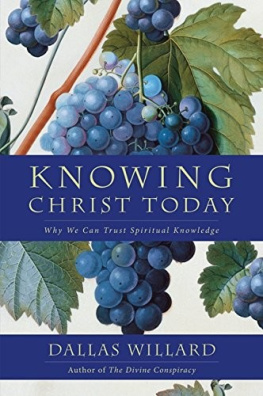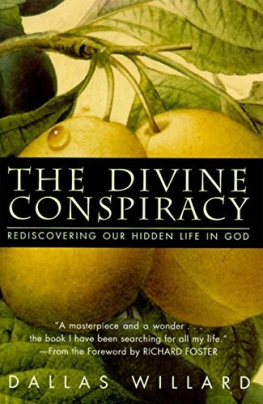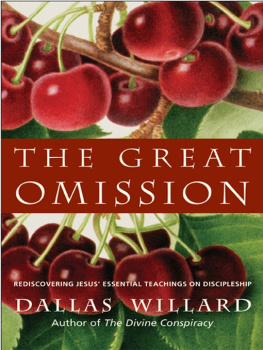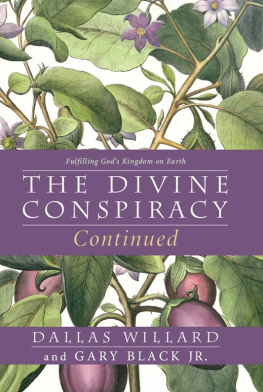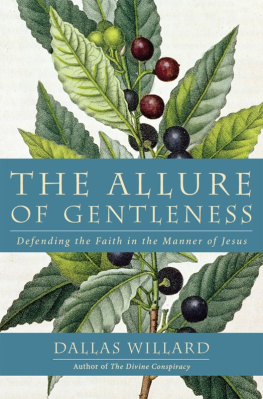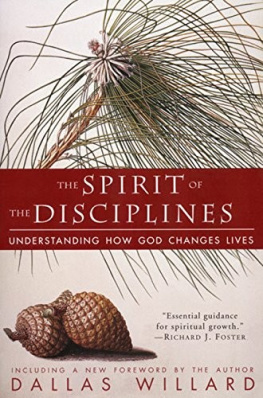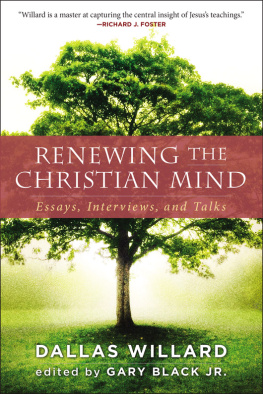Dallas Willard - Knowing Christ Today: Why We Can Trust Spiritual Knowledge
Here you can read online Dallas Willard - Knowing Christ Today: Why We Can Trust Spiritual Knowledge full text of the book (entire story) in english for free. Download pdf and epub, get meaning, cover and reviews about this ebook. year: 2009, publisher: Harper Collins, genre: Religion. Description of the work, (preface) as well as reviews are available. Best literature library LitArk.com created for fans of good reading and offers a wide selection of genres:
Romance novel
Science fiction
Adventure
Detective
Science
History
Home and family
Prose
Art
Politics
Computer
Non-fiction
Religion
Business
Children
Humor
Choose a favorite category and find really read worthwhile books. Enjoy immersion in the world of imagination, feel the emotions of the characters or learn something new for yourself, make an fascinating discovery.
- Book:Knowing Christ Today: Why We Can Trust Spiritual Knowledge
- Author:
- Publisher:Harper Collins
- Genre:
- Year:2009
- Rating:3 / 5
- Favourites:Add to favourites
- Your mark:
- 60
- 1
- 2
- 3
- 4
- 5
Knowing Christ Today: Why We Can Trust Spiritual Knowledge: summary, description and annotation
We offer to read an annotation, description, summary or preface (depends on what the author of the book "Knowing Christ Today: Why We Can Trust Spiritual Knowledge" wrote himself). If you haven't found the necessary information about the book — write in the comments, we will try to find it.
Knowing Christ Today: Why We Can Trust Spiritual Knowledge — read online for free the complete book (whole text) full work
Below is the text of the book, divided by pages. System saving the place of the last page read, allows you to conveniently read the book "Knowing Christ Today: Why We Can Trust Spiritual Knowledge" online for free, without having to search again every time where you left off. Put a bookmark, and you can go to the page where you finished reading at any time.
Font size:
Interval:
Bookmark:
Why We Can Trust Spiritual Knowledge

Dedicated to the memory of
my sister,
Francis Willard Kohler,
who loved me and cared for me
The knowledge of the Holy One is understanding.
P ROVERBS 9:10, NASB
I want to know Christ and the power of his resurrection and the sharing of his sufferings by being like him in his death, if somehow I might attain the resurrection from the dead.
P AUL THE A POSTLE, P HILIPPIANS 3:1011
that you may know the truth concerning the things about which you have been instructed.
L UKE THE P HYSICIAN, L UKE
Support yourgoodness with knowledge .
P ETER THE A POSTLE, 2 P ETER 1:5
In no strange land
O world invisible, we view thee;
O world intangible, we touch thee;
O world unknowable, we know thee;
Inapprehensible, we clutch thee!
Does the fish soar to find the ocean,
The eagle plunge to find the air
That we ask of the stars in motion
If they have rumor of thee there?
Not where the wheeling systems darken,
And our benumbed conceiving soars!
The drift of pinions, would we hearken,
Beats at our own clay-shuttered doors.
The angels keep their ancient places
Turn but a stone, and start a wing!
Tis ye, tis your estranged faces
That miss the many-splendored thing.
But (when so sad thou canst not sadder)
Cryand upon thy sore loss
Shall shine the traffic of Jacobs ladder
Pitched betwixt Heaven and Charing Cross.
Yea, in the night, my Soul, my daughter,
Cry,clinging heaven by the hems:
And lo, Christ walking on the water,
Not of Gennesareth, but Thames!
F RANCIS T HOMPSON
T HIS BOOK IS about knowledge and about claims to knowledge in relationship to life and Christian faith. It is concerned, more precisely, with the trivialization of faith apart from knowledge and with the disastrous effects of a repositioning of faith in Jesus Christ, and of life as his students, outside the category of knowledge. This is one result of the novel and politically restricted understanding of knowledge that has captured our social institutions and the popular mind over the last two centuries in the Western world.
Serious and thoughtful Christians today find themselves in a quandary about knowledge, on the one hand, and religious belief and practice, on the other. It is a socially imposed quandary. In the context of modern life and thought, they are urged to treat their central beliefs as something other than knowledgesomething, in fact, far short of knowledge. Those beliefs are to be relegated to the categories of sincere opinion, emotion, blind commitment, or behavior traditional for their social group. And yet they cannot escape the awareness that those beliefs do most certainly come into conflict with what is regarded as knowledge in educational and professional circles of public life. This conflict has profound effects upon how they hold and practice religious beliefs and how they present them to others.
Those effects are most clearly seen, on the public stage, in the repositioning of Christian teachers and leaders during the last century. They have been left to preside over the rituals of one or another cultural subgroup that, from the viewpoint of received knowledge, is nothing more than a sociological phenomenonan opiate of certain peoplehaving nothing to do with knowledge of a reality with which all human beings must come to terms. This means that Christian teachers are left in the position of trying to coax and wheedle people into professing things and doing things by some means other than providing them knowledge of realityhoping, perhaps, for divine lightning to strike their souls and bring them around.
The perceived gap between what is counted as knowledge and the offerings of Christian teachers is a reflection of the worldwide acceptance of the science and technology of the Western world, but not of the Christian framework of knowledge that gave rise to it. As Anglican theologian Lesslie Newbigin remarks, however: No faith can command a mans final and absolute allegiance, that is to say no faith can be a mans real religion, if he knows that it is only true for certain places and certain people. In a world which knows that there is only one physics and one mathematics, religion cannot do less than claim for its affirmations a like universal validity.1
A natural outcome of this felt tension between the central things Christians believe and what is accepted as knowledge of reality is the destabilization of belief and practice. Belief as mere beliefmy personal opinion, as we now ritually sayis already unstable in its own right. As Plato noted long ago, it tends to waver, to come and go, especially when concerned with the more abstract and ultimate issues of life.2 And that in turn makes character and action based on those beliefs hesitant and variable at best, unsuiting us for steady engagement with the realities (and disengagement from the nonrealities) that we have to deal with. Steadiness in belief and practice then comes to depend upon mere willpower, often taking the form of encrusted close-mindedness or harsh dogmatism. Belief and practice are sustained at great price, if at all. The isolation of faith from knowledge is, accordingly, one major source of the painful difference between what people profess and how they act that is so frequently seen in Christian circlesbut, to be accurate, also in humanity at large. This is often thought of as a failure of will or sincerity, but in fact it goes much deeperit is a matter of whether will and choice are founded on knowledge or the lack of it.
This difficulty is not to be overcome by cultivating or manipulating feeling and emotions, by the practice of ritual or art, or by trying harder to believe and act as we think we should. Just put your hands over your eyes and believe, as some have said. Nor is it overcome by miraculous injections of divine inspiration and upholding from time to time. All of these may have some place. But the problems created by belief without knowledge, or belief in opposition to knowledge cannot be dealt with in such ways. Belief cannot reliably govern life and action except in its proper connection with knowledge and with the truth and evidence knowledge involves. 3
But, we now are bound to ask, is it possible to know the things you believe as a Christian? To what extent? And does it really matter whether you do or not? Doesnt Christian faith automatically relegate you to an intellectual slum? Manyreligious or notdeeply feel that it does. Some even think you should be proud of the slum. That is the status history has managed to hang upon faith. The relationship of religion to knowledge has become severely misunderstood and distorted over the last two centuries. In particular, it has become the accepted view that religion stands free of knowledge, that it requires only faith or commitment. In some quarters great faith has become equated with a belief or commitment that manages to sustain itself, with great effort, against knowledgeor at least with no support from knowledge. Faith is then regarded as essentially a kind of struggle. Some speak of the lonely person of faith as an admirable but odd manifestation of heroic willpower.
In fact, such an interpretation of faith is only one part of the larger contemporary picture in which life and action are seen as fundamentally irrationaltotally governed by feelings, traditions, force, willpower, and blind commitment. The significance of this picture for our contemporary life as a whole is profound. Like gravity in the physical realm, that picture pervasively influences and guides our thinking and actingeven without any specific awareness of it. In religion its effect upon practice is to restrict the foundation of devotion to will and feelings, with no thought that it is based, wholly or in part, upon knowledge of how things really are. In the social context it leads to mutual incomprehension between disagreeing parties, the inability to seek or find common ground, and suspicion, fear, contempt, and hostility. These are now the persistent undertone of our society and especially of its political discourse, frequently involving religion.
Font size:
Interval:
Bookmark:
Similar books «Knowing Christ Today: Why We Can Trust Spiritual Knowledge»
Look at similar books to Knowing Christ Today: Why We Can Trust Spiritual Knowledge. We have selected literature similar in name and meaning in the hope of providing readers with more options to find new, interesting, not yet read works.
Discussion, reviews of the book Knowing Christ Today: Why We Can Trust Spiritual Knowledge and just readers' own opinions. Leave your comments, write what you think about the work, its meaning or the main characters. Specify what exactly you liked and what you didn't like, and why you think so.

